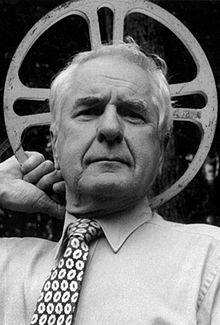Adolfas Mekas
| Adolfas Mekas | |
|---|---|

Filmmaker, educator
|
|
| Born |
30 September 1925 , Lithuania |
| Died | 31 May 2011 (aged 85) Poughkeepsie, New York, U.S. |
| Known for | Cinema |
Adolfas Mekas (30 September 1925 – 31 May 2011) was a Lithuanian-born filmmaker, writer, director, editor, actor and educator. With his brother Jonas Mekas, he founded the magazine Film Culture, as well as the Film-Makers' Cooperative and was associated with George Maciunas and the Fluxus art movement at its beginning. He made several short films, culminating in the feature Hallelujah the Hills in 1963, which was played at the Cannes Film Festival of that year and is now considered a classic of American film.
Adolfas Mekas was born on a farm in , Lithuania to Elžbieta and Povilas Mekas. His sister was Elžbieta and brothers were Povilas, Petras, Kostas and Jonas. Adolfas was the youngest in the family.
At 14 years old, while still in Lithuania, Mekas saw his first film, Captain Blood starring Errol Flynn. In July 1944, toward the end of World War II with Lithuania occupied by both Soviet and German troops, Adolfas and his brother Jonas left Lithuania by train, fearing retaliation for their participation in the underground resistance movement. Near Hamburg, they were taken from the train and put into a forced labor camp. After World War II ended, the brothers were sent across Germany from one displaced persons camps to another. While in Germany, Adolfas attended classes in literature and theater arts and philosophy in Mainz, where he also wrote and published short stories, novels, and children's books. Having been refused entry into Israel, New Zealand, and Canada, Mekas was sent as a refugee to the United States, where he arrived with his brother at the end of 1949.
In the spring of 1950 he purchased a 16mm Bolex camera and took up photography. At the same time, he wrote more than 50 scripts and attended film screenings at the Museum of Modern Art, Cinema 16, Thalia, Stanley, and other venues. He supported himself with a variety of jobs, including washing dishes and working as a foreman in a Castro Convertible factory. He was drafted into the United States Army during the Korean War, where he was assigned to the Signal Corps, and sailed for France in September 1951. On his return to the United States from Europe in 1953, he continued writing and filming and also began organizing the American Film House, along with his brother Jonas. Though the brothers approached many independent filmmakers, none were interested in collaborating on the project. They continued looking for a location in Manhattan for over a year, without success. In 1954 they abandoned the idea of the American Film House and with the money they had borrowed for the project started a film society, which they called the Film Forum. Mekas wrote of the period "We showed films at public schools and at Carl Fischer Hall on 57th Street, wherever we could, until we went bankrupt in the middle of the second film series later in the year just in time to start Film Culture magazine, the first issue of which came out in December 1954."
...
Wikipedia
